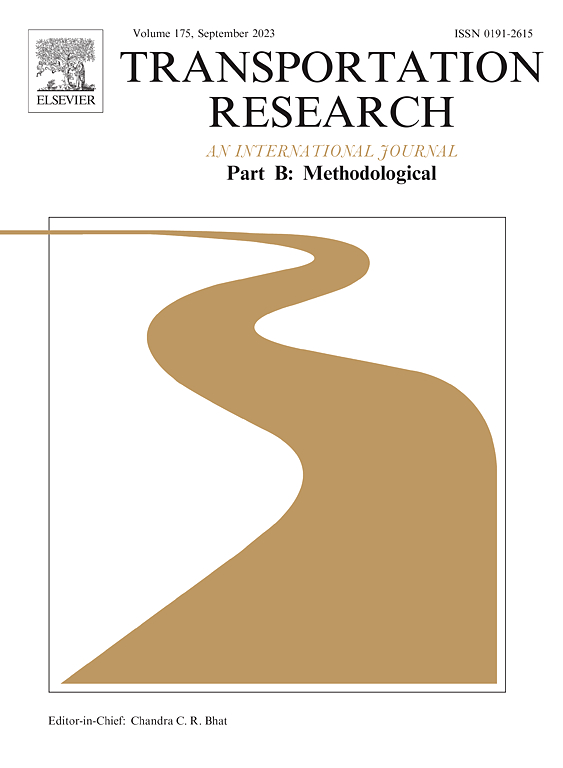充分利用私人停车位:不失策略的双重拍卖交错共享计划
IF 6.3
1区 工程技术
Q1 ECONOMICS
引用次数: 0
摘要
以平台为中介的私人停车位共享(PPSS)被广泛认为是缓解大都市停车问题的可行途径。尽管私人停车位共享的未来令人向往,它将像今天的公共停车场一样方便,但在实践中,如何有效地匹配和定价信息不完整的自利供应商和需求者的矛盾日益加剧。为了调和这一矛盾,本文深入探讨了 PPSS 运营的细微差别,并提出了基于双重拍卖的解决方案,该方案嵌入了交错共享功能,以整合碎片化的非通勤驱动需求。面对交错共享给拍卖机制设计带来的时间异构和不兼容需求的交织难题,我们首先提出了一种基于需求分类的贸易削减(DCTR)拍卖机制,通过 "分而治之 "的思想将混杂的需求分开。我们从理论上证明了 DCTR 拍卖机制在一般情况下满足策略证明(SP)、预算平衡(BB)和个体理性(IR),并在需求类别有限时满足渐进效率(AsE)。为了减少当需求多样化时,DCTR 拍卖机制中的分布式贸易削减所造成的福利损失,我们提出了一系列基于团购的贸易削减(GBTR)拍卖机制,通过事先的分组过程统一需求,并只进行一次统一的贸易削减。为了适应不同的市场条件,我们制定了不同的分组出价确定和交易缩减规则。为了加强隐私保护并减轻认知能力有限的竞标者的策略识别负担,我们进一步设计了 GBTR 拍卖机制的双锁实现(DC-GBTR),它还满足无条件赢家隐私(UWP)和明显策略证明(OSP)。我们还进一步设计了一种混合机制,以便能够整合可能导致预算赤字的机制,并通过根据市场条件自动选择适当的拍卖来协调不同的拍卖,同时确保预期中的 BB。广泛的实验结果凸显了将交错共享纳入拍卖设计的优点,阐明了如何在备选拍卖中进行选择以满足不同的市场条件,展示了混合机制的优越性和潜力,并从不同利益相关者的角度推导出管理见解,以促进 PPSS 市场的导航。本文章由计算机程序翻译,如有差异,请以英文原文为准。
Making the most of your private parking slot: Strategy-proof double auctions-enabled staggered sharing schemes
Platform-intermediated Private Parking Slot Sharing (PPSS) is broadly deemed a viable avenue to alleviate parking problems in metropolises. Despite a captivating future where PPSS will be as convenient as public parking today, tension is mounting in practice concerning how to efficiently match and price self-interested suppliers and demanders with incomplete information. To reconcile this tension, this paper delves into the nuances of PPSS operations and proposes double auction-based solutions that embed staggered sharing to integrate fragmented non-commute-driven demand. Confronting the intertwined difficulties of temporally heterogeneous and incompatible demands imposed by staggered sharing on auction mechanism design, we first propose a Demand Classification-based Trade Reduction (DCTR) auction mechanism that teases apart the conflated demands through the idea of “divide and conquer”. We prove theoretically that the DCTR auction mechanism satisfies Strategy-Proofness (SP), Budget Balance (BB), and Individual Rationality (IR) in general, and Asymptotic Efficiency (AsE) when demand categories are finite. To cut down the welfare loss due to distributed trade reduction in the DCTR auction mechanism when demands are diversified, we propose a family of Group Buying-based Trade Reduction (GBTR) auction mechanisms that unify demands through a preceding grouping process and conduct one unified trade reduction only. We contrive alternative group bid determination and trade reduction rules to accommodate distinct market conditions. To strengthen privacy preservation and relieve the strategy identification burden of cognitively limited bidders, we further design the Double-Clock implementations of the GBTR auction mechanisms (DC-GBTR) that additionally satisfy Unconditional Winner Privacy (UWP) and Obvious Strategy-Proofness (OSP). A hybrid mechanism is further designed to enable the integration of mechanisms that could induce budget deficits and orchestrate different auctions by automatically selecting the proper one depending on market conditions while ensuring BB in expectation. Extensive experimental results highlight the merits of incorporating staggered sharing in auction design, shed light on how to choose among alternative auctions to cater to distinct market conditions, showcase the superiority and potential of hybridization, and deduce managerial insights from the perspectives of different stakeholders to facilitate the navigation of PPSS marketplaces.
求助全文
通过发布文献求助,成功后即可免费获取论文全文。
去求助
来源期刊
CiteScore
12.40
自引率
8.80%
发文量
143
审稿时长
14.1 weeks
期刊介绍:
Transportation Research: Part B publishes papers on all methodological aspects of the subject, particularly those that require mathematical analysis. The general theme of the journal is the development and solution of problems that are adequately motivated to deal with important aspects of the design and/or analysis of transportation systems. Areas covered include: traffic flow; design and analysis of transportation networks; control and scheduling; optimization; queuing theory; logistics; supply chains; development and application of statistical, econometric and mathematical models to address transportation problems; cost models; pricing and/or investment; traveler or shipper behavior; cost-benefit methodologies.

 求助内容:
求助内容: 应助结果提醒方式:
应助结果提醒方式:


